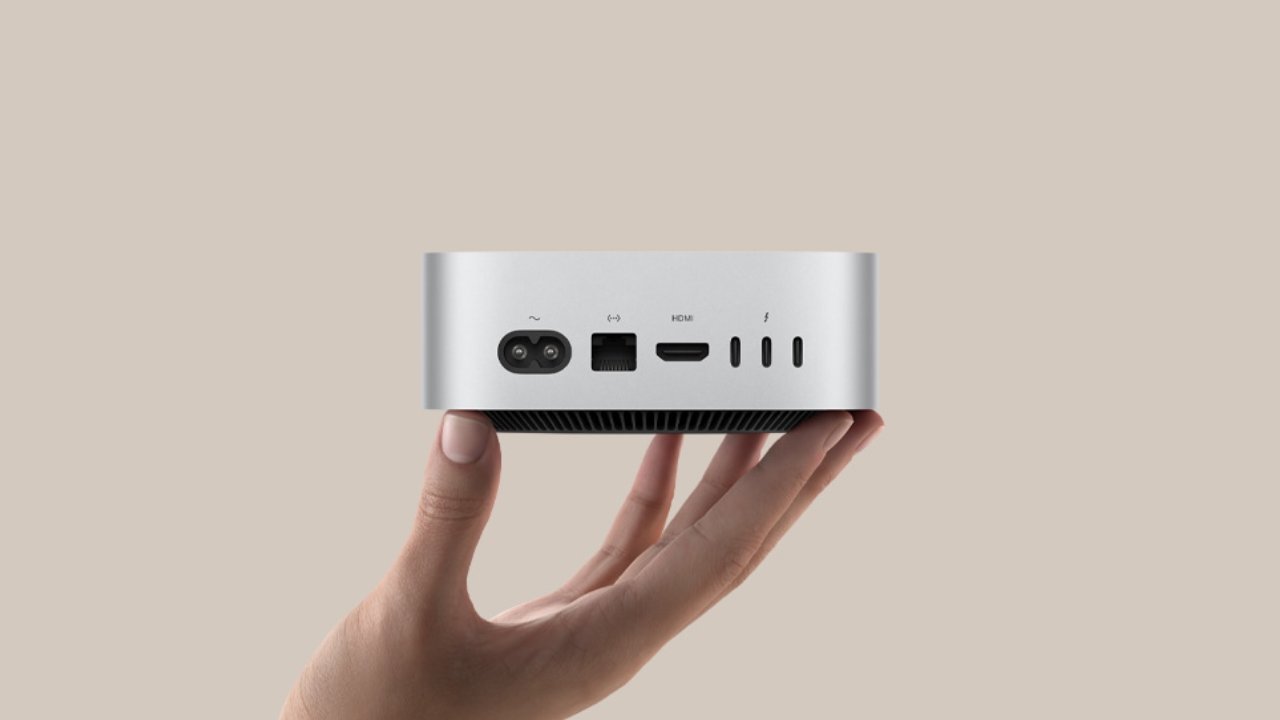The M4 Pro chip inside Apple's ludicrously tiny new Mac Mini would make for an unbelievably good handheld gaming PC
Pity nothing like that will ever happen.

Keep up to date with the most important stories and the best deals, as picked by the PC Gamer team.
You are now subscribed
Your newsletter sign-up was successful
Want to add more newsletters?

Every Friday
GamesRadar+
Your weekly update on everything you could ever want to know about the games you already love, games we know you're going to love in the near future, and tales from the communities that surround them.

Every Thursday
GTA 6 O'clock
Our special GTA 6 newsletter, with breaking news, insider info, and rumor analysis from the award-winning GTA 6 O'clock experts.

Every Friday
Knowledge
From the creators of Edge: A weekly videogame industry newsletter with analysis from expert writers, guidance from professionals, and insight into what's on the horizon.

Every Thursday
The Setup
Hardware nerds unite, sign up to our free tech newsletter for a weekly digest of the hottest new tech, the latest gadgets on the test bench, and much more.

Every Wednesday
Switch 2 Spotlight
Sign up to our new Switch 2 newsletter, where we bring you the latest talking points on Nintendo's new console each week, bring you up to date on the news, and recommend what games to play.

Every Saturday
The Watchlist
Subscribe for a weekly digest of the movie and TV news that matters, direct to your inbox. From first-look trailers, interviews, reviews and explainers, we've got you covered.

Once a month
SFX
Get sneak previews, exclusive competitions and details of special events each month!
This observation definitely isn't going to win me many friends round these parts. But if Intel or AMD launched a chip with the kinds of capabilities just announced for Apple's brand new M4 Pro, with the kind of IPC that Apple silicon delivers, with a GPU and memory bus of similar specs, we'd all lose our tiny minds. And that's why I wish I could buy a PC laptop or gaming handheld with Apple silicon.
Because the new M4 Pro operates on a completely different level. Just to head you off at the rhetorical pass, let's ignore for the moment the myriad caveats which come with this kind of thought experiment, the lack of Windows OS support, question marks over real-world gaming performance on an Apple-designed GPU, difficulties comparing things like ray-tracing performance and all that.
Instead, let's focus on the hardware. For starters, Apple has access to TSMC's very latest N3E production node, otherwise known as the most advanced silicon known to man. AMD uses N4, which is two generations old, while Intel has gone for last-gen N3B for its new Lunar Lake chip.
That's the first clear advantage to Apple, because N3E is proving much more power efficient than N3B and both more efficient and much more dense than N4, the latter being derived from TSMC's N5 node.
Then there's Apple's CPU architecture. In Cinebench 2024's single-thread test, Apple's latest CPU cores in the M4 generation can clock up around 175 points running at 4.4GHz. That compares to 141 points for Intel's brand new Arrow Lake CPU at 5.7GHz and 139 points for the AMD Ryzen 9 9950X, which also has a maximum boost clock of 5.7GHz.
If you normalise those figures for clockspeed, you'll find the Apple chip has 60% better IPC than the Intel or AMD CPUs. 60 bleedin' percent! If Intel launched a new CPU tomorrow with 60% better IPC, we simply wouldn't believe it.
Of course, Cinebench is but one metric. But in other tests, Apple silicon tends to have an IPC advantage of similar proportions. Whatever, there is absolutely no question Apple's M Series chips have far better IPC than anything from AMD or Intel. Oh and the new M4 Pro chip has eight high performance cores. Yikes.
Keep up to date with the most important stories and the best deals, as picked by the PC Gamer team.
Next up, memory bandwidth. Intel's latest Lunar Lake laptop chip maxes out at about 135GB/s for raw bandwidth shared across the CPU and GPU. AMD's Ryzen AI 300 series, codenamed Strix Point, has a similar 128-bit bus and memory support, so is in roughly the same ballpark. But M4 Pro hits 273GB/s, basically double that of any current x86 laptop or handheld chip.
That matters, because bandwidth is so critical for GPU performance. Of course it's GPU performance where this comparison becomes really difficult and where some would argue the wheels come off the entire notion.
But on paper, the M3 Pro has slightly more raw FP16 performance at around 17 TFLOPS than an Nvidia RTX 4070 laptop chip which clocks in at 15.6 FP16 TFLOPS. That's by no means definitive. But it gives you an idea of the scale of shader performance from the 20-core GPU in the M4 Pro.
How the M4 Pro's hardware ray tracing compares to the likes of Nvidia or AMD GPUs is very hard to say. And that's before you get into the likes of Nvidia's DLSS upscaling, ray reconstruction and the like. Really, it's all moot because there are very few proper games that have been compiled and optimised for Apple silicon, anyway.
The other major objection would be power consumption. The M4 Pro will definitely be going into MacBook laptops. But is it plausible for a handheld? Well, Apple hasn't released power consumption figures for the chip. But in testing the old M3 Pro had a low power mode that just breached 30W for GPU and CPU combined and only reduced performance compared to the chip's standard power mode by a few percentage points.
AMD's Strix Point has a maximum TDP of 30W, while Intel's Lunar Lake goes up to 37W. But under full load both of those chips will consume quite a bit more. As for handdhelds, by way of example, Asus's ROG Ally handheld has a 25W Turbo mode on battery power. So, an M4 Pro in a handheld form factor doesn't seem wildly out of the question.

Best CPU for gaming: The top chips from Intel and AMD.
Best gaming motherboard: The right boards.
Best graphics card: Your perfect pixel-pusher awaits.
Best SSD for gaming: Get into the game ahead of the rest.
Moreover, when it comes to battery life, Apple's laptops have a tendency to absolutely blow away most PC laptops. Apple rates the new 14-inch MacBook Pro at 22 hours. That's unlikely to be realistic. But 15 hours probably is. Show me a half-decent PC gaming laptop with anything like that kind of battery life.
Now, I totally get the objections to this kind of thought experiment. It's all academic because very few games are made for MacOS and you can't run Windows natively on Apple silicon. So to be clear, I'm not remotely arguing that it would make sense to try to game on an M4 Pro in reality.
Instead, what I'm saying is that Apple silicon shows how much the other chip makers are leaving on the table when it comes to performance and efficiency. Put another way and to take just one example, how does it make sense that Apple produces CPU cores with far higher IPC than AMD and Intel? It absolutely, positively should be the other way round. AMD and Intel are the CPU core specialists, that's what they exist to create.
Anyway, it's been a slightly frustrating few months, what with Intel's disappointing Arrow Lake CPUs and AMD's merely decent new Zen 5 chips. And then when you look at some of what Apple is achieving with its new M4 chips, you really do have to wonder what AMD and Intel's CPU engineers are playing at.

Jeremy has been writing about technology and PCs since the 90nm Netburst era (Google it!) and enjoys nothing more than a serious dissertation on the finer points of monitor input lag and overshoot followed by a forensic examination of advanced lithography. Or maybe he just likes machines that go “ping!” He also has a thing for tennis and cars.

